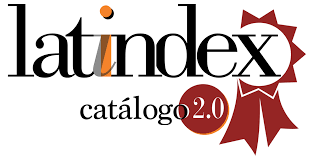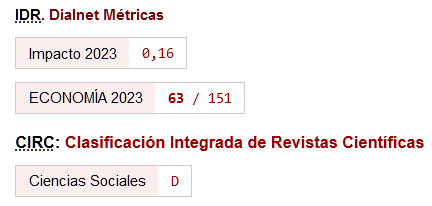Estado de la cuestión del feminismo en la economía de la empresa: el caso español.
Keywords:
Feminist economics, Epistemology, Economics of GenderAbstract
This paper enumerates several feminist perspectives on science and their implications in business sciences. Scientific Spanish papers on Economics and Business in the last years is reviewed across the principal academic reviews searching signs that could show us the feminist advances in this area. The results seem to indicate a process of assimilation when women join these areas. We must suppose that the reason is the belief of economy and particularly the business sciences are neutral to gender, more similar to other experimental sciences as physics or mathematics than to other social sciences.
Downloads
References
BASSI, L.J. (1990): "Confessions of a feminist economist: Why I haven't taught an economic course on women's issues". Women's Studies Quarterly, vol. 17, 3 y 4, pp. 42-57.
BECKER, G. (1965): "A Theory of the Allocation of Time". Economic Journal, 75, pp. 493-517.
https://doi.org/10.2307/2228949
BECKER, G. (1973): "A Theory of Marriage: Part I". Journal of Political Economy, 81, 4, July/August, 813-46. https://doi.org/10.1086/260084
BECKER, G. (1981): "Altruism in the Family and Selfishness in the Marketplace". Economica, 48, February, 1-15. https://doi.org/10.2307/2552939
BORDERÍAS, C.; CARRASCO, C. Y ALEMANY, C. (eds.) (1994): Las mujeres y el trabajo. Rupturas conceptuales. Ed. Icaria. Barcelona.
CALAS, M.B. Y SMIRCICH, L. (1999): "Past postmodernism? Reflections and tentative directions". Academy of Management Review, vol. 24, 4, pp. 646-671. https://doi.org/10.2307/259347
CARRASCO, C. (ed) (1999): Mujeres y economía. Nuevas perspectivas para viejos y nuevos problemas, Barcelona: Icaria.
CARRASCO, C. (2001): "La sostenibilidad de la vida humana: ¿un asunto de mujeres?". Mientras Tanto, nº 82, pp. 43-70.
CARRASCO, C.; ALABART, A.; DOMÍNGUEZ, M. Y MAYORDOMO, M. (2001): "Hacia una nueva metodología para el estudio del trabajo: propuesta para una EPA alternativa" en Tiempos, trabajos y género. Carrasco, C. (ed) Icaria. Barcelona.
CASEY, C (2004): "Contested Rationalities, Contested Organizations: Feminist and Postmodernist Visions". Journal of Organizational Change Management, vol. 17, 3 pp. 302-314. https://doi.org/10.1108/09534810410538351
CÉSPEDES LORENTE, J.J. Y SÁNCHEZ PERES, M. (1996): "Tendencias y desarrollos Recientes en los Métodos de Investigación y análisis de los Datos en Dirección de empresas". Revista Europea de Dirección y Economía de la Empresa, vol. 5, 3, pp. 23-40.
CIDE/INSTITUTO DE LA MUJER (2004): Mujeres en cargos de representación del Sistema Educativo. Madrid.
DEEM, R. Y OZGA, J.T. (2000): "Transforming post-compulsory education? Femocrats at work in the academy". Women's Studies International Forum. Vol. 23, 2 pp. 153-166. https://doi.org/10.1016/S0277-5395(00)00070-4
DURÁN, M. A. (1982): "Liberación y utopía: la mujer ante la ciencia" En: María A. Durán (ed) Liberación y utopía. Madrid, Akal, 7-34
EBY, L.T., CASPER, W.J.; LOCKWOOD, A.; BORDEAUX, C. Y BRINLEY, A. (2005): "Work and family research in IO/OB: Content analysis and review of the literature (1980-2002)". Journal of Vocational Behavior, vol. 66, pp. 124-197. https://doi.org/10.1016/j.jvb.2003.11.003
EVELINE, J. Y BOOTH, M. (2004): "Don't write about it" - Writing "the other" for the ivory basement". Journal of Organizational Change Management. Vol. 17, 3, pp. 243-255. https://doi.org/10.1108/09534810410538306
FERNÁNDEZ, J. (2000): "¿Es posible hablar científicamente de género sin presuponer una generología?". Papeles del psicólogo. Época III, nº 75, pp. 3-12.
GARCÍA DE LEÓN, M. A. Y GARCÍA DE CORTÁZAR, M. (Coed) (2001): Las académicas (Profesorado universitario y género). Instituto de la Mujer. Madrid.
GARCÍA MERINO, M. T.; RODRÍGUEZ PINTO, J.; SANTOS ALVAREZ, M.V. (2000): "El Estado de la Investigación en Dirección Estratégica en España: Una Aproximación mediante las Publicaciones Periodicas". Cuadernos de Información Económica, nº 156, pp. 80-91.
GUERRAS MARTÍN, L.A.; RUIZ CABESTRE, F.J. Y RUIZ VEGA, A.V. (1999a): "El Estado de la Investigación Empírica sobre Economía de la Empresa; análisis de las Publicaciones Españolas". Papeles de Economía Española, nº 78-79, pp. 302-317.
GUERRAS MARTÍN, L.A.; RUIZ CABESTRE, F.J. Y RUIZ VEGA, A.V. (1999b): "Tipología de las Investigaciones sobre Economía de la Empresa publicadas en Revistas Españolas (1995-1998)". Boletín de Estudios Económicos. Vol. 65, pp. 301-327.
GUTIÉRREZ CALDERÓN, I. (1995): "El Estado de la Investigación en Dirección de empresas a través de las Publicaciones Periódicas Especializadas". Investigaciones Europeas de dirección y Economía de la Empresa, vol. I, 1, pp. 65-79.
HARDING, S. (1986): The Science Question in Feminism. Cornell University Press.
HARDING, S. (1987): Feminism and Methodology: Social Sciences Issues. Bloomington. Indiana University Press.
HARDING, S. (1996): Ciencia y feminismo. Morata. Madrid.
HELFAT, C.E. (2002): "Work-life issues in academia and business - The current state of affairs". Journal of Management Inquiry, vol. 11, 3 pp. 329-331. https://doi.org/10.1177/1056492602113028
HEWISTON, G.J. (1999): Feminist Economics: Interrogating the Masculinity of Rational Economic Man. Northamton. Massachusets: Edward Elgar Pub.
JONES, D. (2004): "Screwing diversity out of the workers? Reading diversity". Journal of Organizational Change Management. Vol. 17, 3, pp. 281-291. https://doi.org/10.1108/09534810410538333
KIMMEL, M.S. (2000): The Gendered Society. New York: Oxford University Press.
https://doi.org/10.1093/oso/9780195125870.001.0001
LONGRES, J.F. (1996): "Marketing as an exercise in feminism". Journal of Social Work Education, vol. 32, 3, pp. 294-295. https://doi.org/10.1080/10437797.1996.10778460
MAAK, M.N.; PASSET, J.E. (1993): "Unwritten Rules - Mentoring Women Faculty". Library & Information Science Research, vol. 15, 2, pp. 117-141.
MARTIN, J.; KNOPOFF, K, Y BECKMAN, C. (1998): "An alternative to bureaucratic impersonality and emotional labor: Bounded emotionality at The Body Shop". Administrative Science Quarterly, vol. 43, 2, pp. 429-469. https://doi.org/10.2307/2393858
MCCRATE, E. (1987): "Trade, Merger and Employment: Economic Theory on Marriage", Review of Radical Political Economics, 19, 1, Spring, 73-89. https://doi.org/10.1177/048661348701900104
MCDONAGH, P. Y PROTHERO A. (1997): "Leap-frog marketing: the contribution of ecofeminist thought to the world of patriarcal marketing". Marketing Intelligence & Planning, vol. 15, 7, pp. 361-368. https://doi.org/10.1108/02634509710193190
MILLER, K.S. (1997): "Woman, man, lady, horse: Jane Stewart, public relations executive". Public Relations Review, vol. 23, 3, pp. 249-269. https://doi.org/10.1016/S0363-8111(97)90035-7
MILOJEVIC, I. (1998): "Women's Higher Education in the 21st Century". Futures, vol. 30, 7, pp. 693-703. https://doi.org/10.1016/S0016-3287(98)00076-7
MOLINA FERNANDEZ, L.M.; LLORÉIS MONTES, FCO. J.; FUENTES FUENTES; Mª M. (2003): "La investigación en gestión de la calidad en España (1990-1999)". Cuadernos de Economía y dirección de la Empresa, nº 16, pp. 5-26.
OAKES, L.S. Y HAMMNOD, T.A. (1995): "Biting the Epistemological Hand: Feminist Perspectives on Science and their Implications for Accounting Research". Critical perspectives on Accounting, nº 6, pp. 49-75. https://doi.org/10.1006/cpac.1995.1007
ORTIZ GÓMEZ, T (1999): Universidad y feminismo II. Los Estudios de las Mujeres en España (1992-1995). Granada. Colección Feminae.
ORTIZ GÓMEZ, T; BIRRIEL SALCEDO, J Y PARRA MARIN, V (1998): Universidad y feminismo en España (I). Bibliografía de Estudio de las Mujeres (1992-1996). Granada Colección Feminae.
PÉREZ OROZCO, A. (2007): Perspectivas Feministas en torno a la Economía. El caso de los cuidados. Consejo Económico y Social.
PICCHIO, A. (2001): "Un enfoque macroeconómico 'ampliado' de las condiciones de vida" en Tiempos, trabajos y género. Carrasco, C. (ed) Icaria. Barcelona.
PINES, A.M.; DAHAN-KALEV, H. Y RONEN, S. (2001): "The influence of feminist self-definition on the democratic attitudes of managers". Social Behavior and Personality, vol. 29, 6, pp. 607-615.
https://doi.org/10.2224/sbp.2001.29.6.607
PONS NOVELL, J Y TIRADO FABREGAT, D.A. (1999): "¿Quién publica en las Revistas Españolas de Economía?". Revista de Economía Aplicada, vol. 7, 20, pp. 139-166.
PONS NOVELL, J. Y TIRADO FABREGAT, D.A. (2001): "El impacto de las revistas españolas de economía. Un estudio referido a 1998". Información Comercial Española. Revista de Economía, (795), pp. 155-178, 62.
REARDON, K. (1993): "The Memo Every Woman Keeps in her Desk". Harvard Business Review, nº 71, 2, pp. 16-.
ROSS-SMITH, A Y KOMBERGER, M. (2004): "Gendered Rationality? A Genealogical Exploration of the Philosophical and Sociological Conceptions of Rationality, Masculinity and Organization". Gender Work and Organization, vol. 11, 3, pp. 280-305. https://doi.org/10.1111/j.1468-0432.2004.00232.x
SCHIEBINGER, LONDA (1999): Has Feminism Changed Science? Cambridge, MA. Harvard University Press. https://doi.org/10.7788/figurationen.1999.0.0.50
SCHUSTER, M. Y VAN DYNE, S. (1984): "Placing Women in the Liberal Arts: Stages of Curriculum Transformation". Harvard Educational Review, 54, p. 419. https://doi.org/10.17763/haer.54.4.r41216gm62x25120
SCOTT, J.W. (1990): "El género: una categoría útil para el análisis histórico" en Historia y Género. La mujeres en la Europa Moderna y Contemporánea. Samuel Amelang y Mary Nash (eds.). Alfons el Magnanim Valencia, pp. 23-59.
SINCLAIR, A. (2005): "Body and Management Pedagogy". Gender Work and Organization, vol. 12, 1, pp. 89-104. https://doi.org/10.1111/j.1468-0432.2005.00264.x
WHITEHEAD, S. (2001): "The invisible gendered subject: men in education management". Journal of Gender Studies, vol. 10, 1, pp. 67-82. https://doi.org/10.1080/095892301300050591
WYN, J.; ACKER, S. Y RICHARDS, E. (2000): "Making a Difference: women in management in Australian and Canadian faculties of education". Gender and Education, vol. 12, 4, pp. 435-447.
Downloads
Published
How to Cite
Issue
Section
License
This licence allows third parties to share (copy and redistribute the material in any medium or format) and adapt (remix, transform and create from the material for any purpose, including commercial purposes), provided that authorship and first publication in this journal (The Journal, DOI of the work) is acknowledged, a link to the licence is provided, and it is stated whether changes have been made to the work.







